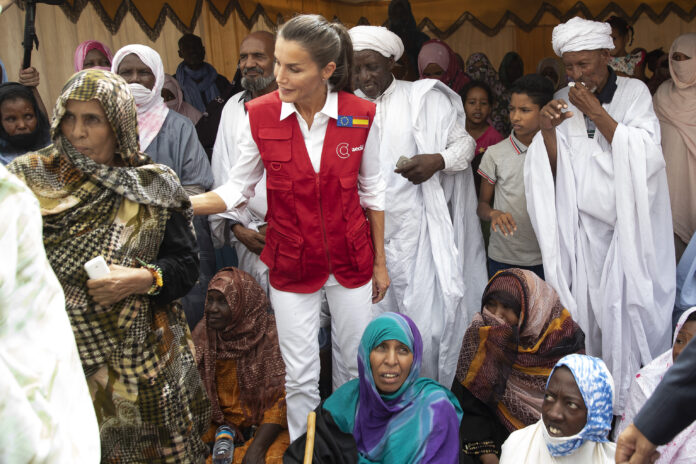The tiny grains of sand slip through the clothes, reaching any point of the body, sticky due to the 38 degree temperature with a humidity of 21% that this morning was in Nouakchott, the capital of Mauritania. Despite these conditions, fifty locals wait crowded under a tent. They don’t complain, they barely talk. They are women dressed in the malefa and men with the bubu, a typical local costume. They await the arrival of Queen Letizia, who began her first day in Mauritania by greeting that diverse group outside the National Fish Distribution Society.
The Queen learned about one of the most emblematic projects of the Spanish Cooperation in Mauritania. Accompanied by Mariam Mint Ahmed, First Lady of the Islamic Republic, Doña Letizia visited the Nouakchott Logistics Platform, to which trucks arrive every day with the capacity to transport 40 tons of fish to be distributed among the poorest population, which thanks to the subsidies can purchase two kilos of fish for the price of a loaf of bread.
Fatma mint Mohamed is one of the beneficiaries of this service. With a five-year-old girl whom she has adopted in her arms, she explains to this medium that children “like to eat fish a lot.” So four days a week they go to their distribution point to buy their subsidized ration of fish and include it in the family diet.
“The Aecid promoted the creation of the National Fish Distribution Society in 2012”, explains Lierni Galdós, responsible for Cooperation Programs in Mauritania. Until today, thanks to this project that began with a budget of five million euros, there are seven distribution platforms that manage 400 tons of fish. “Now we are working on the quality of the distribution and the beneficiaries: 300,000 people with a poverty profile of 55%. The objective is to reach 400,000 people with a profile of 75% poverty,” explains Galdós.
Because the conditions of poverty in this country are extreme. With a GDP per capita of 1,500 euros and salaries that do not reach 150 euros per month, only subsidies and cooperation are ways for citizens to improve their quality of life.
In addition to the fishing project, the Spanish Cooperation is very involved and committed to the fight against gender violence and equality. Foreign sources summarize Spanish cooperation as “dialogued and feminist”. For this reason, after learning about the fish distribution platform, Doña Letizia visited a police station where sexual abuse of girls is reported.
In Mauritania there is a lot of sexual violence against children under 15 years of age, who suffer female sexual mutilation, early marriage and forced fattening to conform to national beauty standards. We try to fight against all this through the cross-cutting program for the prevention and protection of victims of gender-based violence. At the police level, a protocol has been established so that local agents know how to deal with women who report some type of sexual violence. “For example, we have achieved that when they go to report abuse, no one asks them if they were virgin women,” they explain to EL MUNDO.
The program also trains judges in gender equality and in the origin of the problem, they are training those responsible for caring for victims in six hospitals. “The data on gender violence that we have is negligible because the obstacle to access to rights is still enormous,” denounces Marina Stussi, representative of Doctors of the World, one of the 18 Spanish NGOs that work in Mauritania. “For them, reporting is a very serious problem because there is no system that can really protect them.”
All this has been explained to the Queen while she toured the facilities of the police station, which is focused on the care of girls who have suffered sexual violence in West Nouakchott. Doña Letizia has asked about the shelter and protection of young people once they file a complaint and return to their villages or homes.
Conforms to The Trust Project criteria








